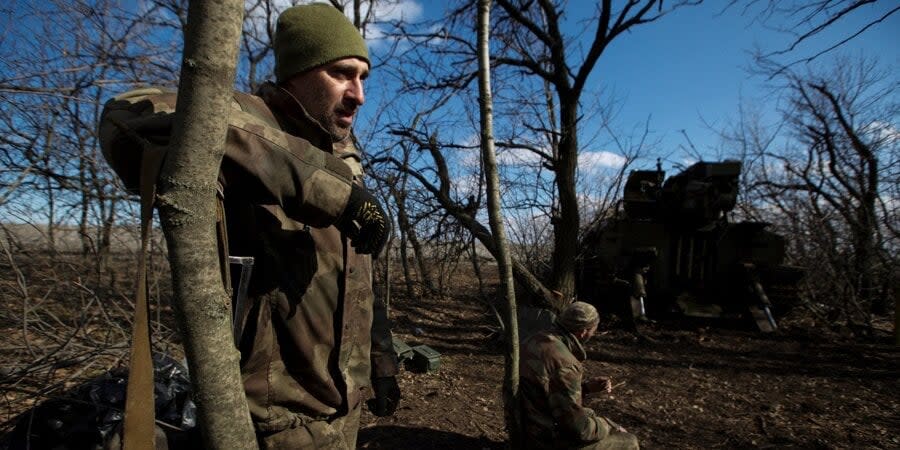ISW says fighting for Bakhmut exhausting Russians, preparing ground for Ukrainian counter-offensive

That’s according to the latest report by the U.S.-based think tank the Institute for the Study of War, issued for March 5.
Read also: Putin’s latest address failed to articulate specific goals for war in Ukraine, says ISW
Thanks to effectiveness of the Ukrainian army, even if the city is occupied, the battle will be a factor that contributes to Ukrainian counter-offensive just as in the summer 2022 when Russia first lost the initiative in the war, ISW analysts said.
The ISW’s latest Russian offensive campaign assessment is completely devoted to the current Ukrainian efforts to defend Bakhmut and the possible course of events if Russia captures this town.
The experts suggest that Ukrainian troops may conduct a limited tactical withdrawal in the eastern part of Bakhmut, while still causing great losses to the Russian army. If the Russian army manages to secure the town, it might renew its offensive attempt in the direction of either Kostyantynivka or Slovyansk (or both).
But in this scenario Russian forces will struggle with personnel and equipment shortages. So, several factors will likely contribute simultaneously to a future Ukrainian counter-offensive, namely:
Read also: Wagner’s Prigozhin using success in Soledar to bolster his group’s reputation, says ISW
The probable culmination of fighting for Bakhmut, whether or Russia actually captures the city;
The already culminated Russian assault on Vuhledar;
Sthe talling by Ukrainian defenders of the Russian offensive in Luhansk Oblast.
The ISW experts based their point of view on the following observations.
The Ukrainian defense of Bakhmut remains strategically sound as long as it continues to eliminate enemy forces without great suffering from the Ukrainian side (relative to the Russian one). Fighting among urban areas is exhausting Russian offensive as it is always easier to protect a city.
The city planning and especially the Bakhmutivka River play in favor of Ukrainian defenders, if they are able to remain in control of Bakhmut-Kostyantynivka highway to the south of the city. The scenario could be similar to those with the fighting retreat of Ukrainian troops from Severodonetsk and Lysychansk that ended Russian offensive actions in Luhansk and Donetsk oblasts in summer 2022.
The Russian fight for Bakhmut will likely culminate (in exhaustion of offensive capabilities — ed.), whether the Russian army captures the city or not. It is likely that any other offensive activities will be very problematic for Russia for the next several months, as it has already lost a lot of mobilised soldiers near Vuhledar in Donetsk Oblast.
Read also: ISW says Russians’ claim to have captured Soledar false, Bakhmut not under encirclement threat
The fight for Bakhmut has been ongoing for nine months with no success, despite reverses being thrown into battle there. It has also had no success in other areas — Kharkiv and Luhansk oblasts — so far, as it seems Russia has not enough reserves to maintain offensive attempts in several directions.
The Russian assault on Bakhmut doesn't contribute to reaching either its operational or strategic military goals, the Ukrainian army in contrast has the opportunity to regain the initiative on the battlefield.
Even Russian supporters of the war lowered their expectations of Russian forces’ offensive ability amid its fight for Bakhmut that has dragged on “forever” and acknowledged the necessity for an operational pause following the possible occupation of this city.
The ISW has given other conclusions on possible further Russian army’s actions after the culmination of fighting for Bakhmut:
The chronic personnel and equipment shortage will likely prevent invading Russian forces from launching another ambitious assault similar to the fight for Bakhmut. The ISW doesn't believe Russia is able to continue attacking with "people waves", as it did before. Also, Putin has postponed the next wave of mobilisation in Russia since January 2023, hoping for covert measures to avoid possible unrest.
Russia also lacks ammunition and its military industry isn't able to address this issue in near future.
Russia will likely use more extensively irregular military, but their combat capability isn't clear, especially in the light of the fight for Bakhmut. Wagner Group private military company has opened centers in 30 Russian cities as of March 5, but several months are needed to send fresh people to the front line, which will hinder the Russian offensive on the east of Ukraine.
It is not clear, but it is unlikely that Russian forces intended to relaunch their offensive on Vuhledar.
Under the assumption that Russian forces capture Bakhmut, they would have the choice of two diverging lines of advance, but most likely they will make no significant gains from it. They could advance to the west along the T0504 highway in the direction of Kostyantynivka or to the northwest along the E40 in the direction of Slovyansk. However, these both directions are not mutually supporting. Anyway, in any direction they are likely to encounter fierce Ukrainian resistance. If they opt for an operational pause and recovery, it will set conditions for a Ukrainian counter-offensive.
We’re bringing the voice of Ukraine to the world. Support us with a one-time donation, or become a Patron!
Map of combat operations: the battle for Bakhmut, battles in the Donbass and Zaporizhzhya region, the situation in the south and northeast of Ukraine
Read the original article on The New Voice of Ukraine

